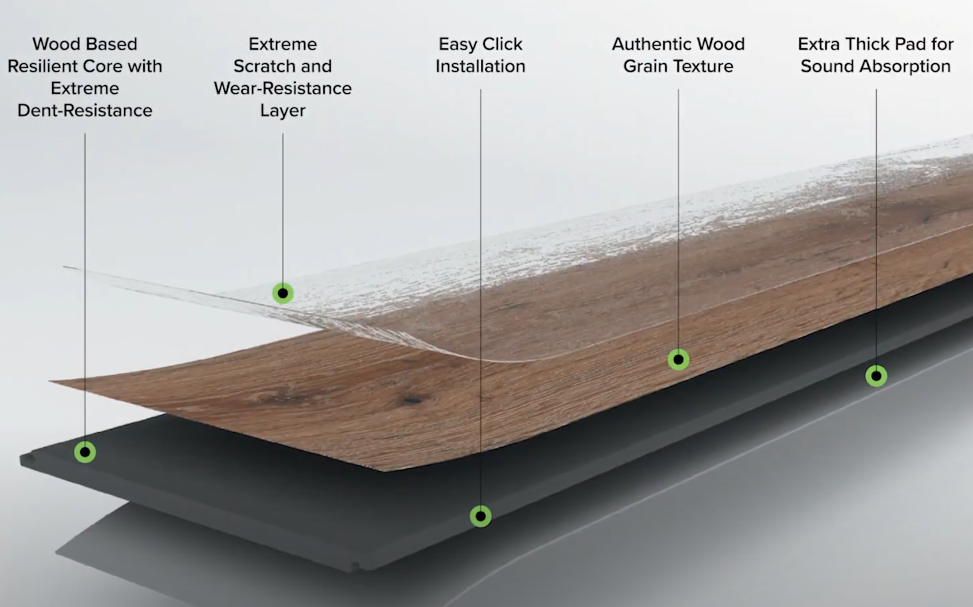NEWS TAG
brand
What is Hybrid Resilient Flooring & Differences with Luxury Vinyl Plank
Hybrid resilient flooring has become a popular choice in the flooring industry, combining the best features of vinyl plank and laminate flooring. But what exactly is hybrid flooring, what makes it unique, and how does it compare to luxury vinyl plank (LVP)? Let's help you better understand this versatile flooring option.
What is Hybrid Resilient Flooring?
Hybrid flooring is a term uniquely popular in Australia and refers to a product that integrates elements from both vinyl plank and laminate flooring. The concept of hybrid flooring was introduced around seven years ago by a company called Godfrey Hirst, and the name has stuck ever since.

The first generation of hybrid flooring was SPC (Stone Plastic Composite), which combines limestone (80%) and PVC (20%) in its core. While initially marketed as a "miracle product," SPC had its challenges. It required a perfectly level subfloor due to its rigid nature and used a basic 2G click system, which locked boards laterally but not vertically. Furthermore, SPC contained silica, a potentially hazardous binding agent associated with the disease silicosis.
To address these shortcomings, the second generation of hybrid flooring, WPC (Wood Plastic Composite), replaced limestone with wood powder in its core. While this improved flexibility, wood powder was not 100% waterproof, limiting its performance.
The third generation and modern "Next Generation Hybrid Flooring" replaced these cores with a virgin aerated polymer core. This innovation improved flexibility, made the flooring 100% waterproof, enhanced acoustic properties, and introduced a premium 5G locking mechanism. The 5G click system locks boards securely both laterally and vertically and makes installation simple and efficient.
Today, hybrid flooring combines a commercially rated luxury vinyl plank top layer with a durable polymer core and a pre-attached EVA foam underlay for added comfort and noise reduction.
Pros and Cons of Hybrid Flooring
Pros of Hybrid Flooring
100% Waterproof: Hybrid flooring is highly water-resistant, making it suitable for kitchens, bathrooms, and laundry rooms.
Durability: Its multi-layered construction ensures scratch resistance and resistance to wear and tear from pets, kids, and daily use.
Easy Installation: Hybrid flooring can be installed as a floating floor over various subfloors, including tiles.
Low Maintenance: Cleaning hybrid flooring is simple—just use warm water with vinyl cleaner and a mop.
Acoustic Benefits: The pre-attached underlay improves sound insulation, reducing noise.
Style Options: Available in a variety of designs and textures, hybrid flooring mimics natural materials like wood and stone.
UV Resistance: Some hybrid floors include UV-stable print films, reducing the risk of fading in sunny environments.
Versatility: Hybrid flooring performs well in diverse conditions, including uneven subfloors.
Cons of Hybrid Flooring
Rigid Core Sensitivity: While hybrid flooring can be installed over tiles, uneven grout lines may create a slight hollow sound.
Not Indestructible: Heavy impacts, such as dropping a bowling ball, can dent the surface.
Potential Fading: Prolonged exposure to direct sunlight may cause fading, though UV tints on windows can help mitigate this.
Hybrid Resilient Flooring vs. Luxury Vinyl Plank (LVP)
While hybrid flooring and luxury vinyl plank share many similarities, they differ in construction, durability, and application.
Construction
Hybrid Flooring: Features a rigid core (SPC, WPC, or aerated polymer) with a pre-attached underlay. Its rigid core provides stability, waterproofing, and acoustic benefits.
Luxury Vinyl Plank: Made entirely of PVC, LVP is flexible and thinner compared to hybrid flooring. It typically requires a separate underlay for cushioning and noise reduction.
Waterproofing
Hybrid Flooring: Fully waterproof, making it ideal for wet areas.
Luxury Vinyl Plank: Water-resistant but not entirely waterproof, especially in areas prone to standing water.
Durability
Hybrid Flooring: More rigid and resistant to dents, scratches, and wear, making it suitable for high-traffic areas.
LVP: Softer and more prone to dents under heavy furniture or sharp objects.
Ease of Installation
Hybrid Flooring: Its 5G click system and pre-attached underlay make it a DIY-friendly option that can be installed over various subfloors, including tiles.
LVP: Requires a smoother subfloor and may need an additional underlay, increasing installation time and cost.
Comfort Underfoot
Hybrid Flooring: Slightly thicker and more forgiving underfoot due to its rigid core and EVA foam underlay.
LVP: Thinner and less cushioned, but still comfortable compared to harder flooring materials.
Eco-Friendliness
Hybrid Flooring: Some hybrid products feature eco-friendly cores that are biodegradable at the end of their lifespan.
LVP: Made entirely of PVC, which is less environmentally friendly.
Cost
Hybrid Flooring: Generally more expensive upfront due to its advanced construction and added features like waterproofing and acoustic layers.
LVP: More budget-friendly, making it a popular choice for cost-conscious buyers.
